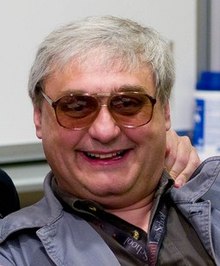
Prominent appeals court Judge Alex Kozinski accused of sexual misconduct
A former clerk for Judge Alex Kozinski said the powerful and well-known jurist, who for many years served as chief judge on the U.S. Court of Appeals for the 9th Circuit, called her into his office several times and pulled up pornography on his computer, asking if she thought it was photoshopped or if it aroused her sexually.
Heidi Bond, who clerked for Kozinski from 2006 to 2007, said the porn was not related to any case. One set of images she remembered was of college-age students at a party where “some people were inexplicably naked while everyone else was clothed.” Another was a sort of digital flip book that allowed users to mix and match heads, torsos and legs to create an image of a naked woman.
Bond is one of six women — all former clerks or more junior staffers known as externs in the 9th Circuit — who alleged to The Washington Post in recent weeks that Kozinski, now 67 and still serving as a judge on the court, subjected them to a range of inappropriate sexual conduct or comments. She is one of two former clerks who said Kozinski asked them to view porn in his chambers.
In a statement, Kozinski said: “I have been a judge for 35 years and during that time have had over 500 employees in my chambers. I treat all of my employees as family and work very closely with most of them. I would never intentionally do anything to offend anyone and it is regrettable that a handful have been offended by something I may have said or done.”
Kozinski provided the statement after The Post called and emailed a spokesman with a detailed list of the allegations this story would include. After the story posted online, the judge told the Los Angeles Times, “I don’t remember ever showing pornographic material to my clerks” and, “If this is all they are able to dredge up after 35 years, I am not too worried.”
When Bond was clerking, Kozinski was on the precipice of becoming chief judge for the 9th Circuit — the largest federal appeals court circuit in the country, handling cases for a large swath of the western United States as well as Hawaii and Alaska. The other people who alleged that Kozinski behaved inappropriately toward them worked in the 9th Circuit both before and after her, up to 2012.
Bond said she knew that she was to come to the judge’s office when her phone beeped twice. She said she tried to answer Kozinski’s inquiries as succinctly and matter-of-factly as possible. Bond was then in her early 30s and is now 41.
If the question was about photoshopping, Bond said, she would focus on minor details of the images. If Kozinski asked whether the images aroused her, Bond said, she would respond: “No, this kind of stuff doesn’t do anything for me. Is there anything else you need?” She said she recalled three instances when the judge showed her porn in his office.
“I was in a state of emotional shock, and what I really wanted to do was be as small as possible and make as few movements as possible and to say as little as possible to get out,” Bond said.
Bond, who went on to clerk for the Supreme Court and now works as a romance novelist writing under the name Courtney Milan, and another clerk, Emily Murphy, who worked for a different judge on the 9th Circuit and is now a law professor, described their experiences in on-the-record interviews. The other four women spoke on the condition that their names and some other identifying information not be published, out of fear that they might face retaliation from Kozinski or others.
Kozinski, who served as the chief judge on the 9th Circuit from 2007 to 2014, remains a prominent judge, well known in the legal community for his colorful written opinions. His clerks often win prestigious clerkships at the Supreme Court.
Murphy, who clerked for Judge Richard Paez, said Kozinski approached her when she was talking with a group of other clerks at a reception at a San Francisco hotel in September 2012. The group had been discussing training regimens, and Murphy said she commented that the gym in the 9th Circuit courthouse was nice because other people were seldom there.
Kozinski, according to Murphy and two others present at the time who spoke to The Post, said that if that were the case, she should work out naked. Those in the group tried to change the subject, Murphy and the others present said, but the judge kept steering the conversation toward the idea of Murphy exercising without clothes.
“It wasn’t just clear that he was imagining me naked, he was trying to invite other people — my professional colleagues — to do so as well,” Murphy said. “That was what was humiliating about it.”
Bond, similarly, provided emails showing that she told a friend what had happened at least as of 2008. The friend, fellow romance novelist Eve Ortega, provided the same emails. She confirmed that Bond had told her years ago that Kozinski made inappropriate sexual comments and showed her porn.
Kozinski has previously been embroiled in controversies related to sexually explicit material.
In 2008, the Los Angeles Times revealed that the judge had maintained an email list that he used to distribute crude jokes, some of them sexually themed, and that he had a publicly accessible website that contained pornographic images.
A judicial investigation ultimately found that Kozinski did not intend to allow the public to see the material and that, instead, the judge and his son were careless in protecting a private server from being accessible on the Internet.
Anthony J. Scirica, then the chief judge of the U.S. Court of Appeals for the 3rd Circuit, wrote at the time that Kozinski’s “conduct exhibiting poor judgment with respect to this material created a public controversy that can reasonably be seen as having resulted in embarrassment to the institution of the federal judiciary.”
According to Scirica’s report, Kozinski said that he used the server to keep a variety of items he received by email, including TV commercials, video clips, cartoons, games and song parodies.
Of the sexually explicit files, Kozinski testified: “Some I thought were odd or funny or bizarre, but mostly I don’t have a very good reason for holding onto them. I certainly did not send them to anyone else or ask anyone to send me similar files,” according to Scirica’s report.
Kozinski also testified that he “does not visit and has no interest in pornographic websites,” according to Scirica’s report. He separately apologized for any embarrassment he had caused in maintaining the email list and said he had stopped sending the jokes.
Bond said the images Kozinski showed her seemed to come from his private server, because he pulled them from a site containing the term “kozinski.com.”
The other Kozinski clerk who said the judge showed her porn declined to provide specifics out of fear that Kozinski would be able to identify her. Bond said the judge also showed her a chart he claimed he and his friends from college had made to list the women with whom they had had sexual relations.
Bond said that either Kozinski or his administrative assistant reached out to her around the time of the news reporting on his private server, asking whether she would be willing to defend his character. She wrote to Ortega about the inquiry in 2008, according to emails the women shared with The Post, and Ortega responded that it “sounds like a very bad idea to me.”
“I know he brought you into his office to show you porn, I know he made sexual innuendos to you. I know this because you told me so in DC, and you even used the words sexual harassment,” Ortega wrote. “You said you would warn off other women thinking of clerking for him. And if there’s a woman out there he harassed worse than you, do you really want to be pitted against her? Because that’s what it would be. I’m worried that this is what he’s asking you to do — to be the female, intelligent face of his defense and make whoever it is accusing him look like a stupid slut, and then he hopefully never has to actually address those allegations.”
Kozinski was born in Romania to Holocaust survivors in 1950, and the family fled the communist state when he was a boy. Decades ago, long before he was a federal judge, he appeared on the television show “The Dating Game,” planting a kiss on a surprised young woman who selected him for a date. He is married and has three sons.
Kozinski was appointed to the 9th Circuit by President Ronald Reagan in 1985. He is an atypical federal appeals court judge — authoring irreverent opinions and not shying, as many of his colleagues do, from media appearances.
He styled one opinion in 2012 not as a traditional concurrence or dissent, but instead as “disagreeing with everyone.” He famously wrote during a trademark dispute between the toy company Mattel and the record company that produced the 1997 song “Barbie Girl”: “The parties are advised to chill.”
In more recent years, Kozinski wrote that using lethal injections to impose the death penalty was “a misguided effort to mask the brutality of executions by making them look serene and beautiful — like something any one of us might experience in our final moments,” and he told the Los Angeles Times, “I personally think we should go to the guillotine, but shooting is probably the right way to go.”
The Post reached out to dozens of Kozinski’s former clerks and externs for this report. Many of those who returned messages said that they experienced no harassment of any kind and that their experience — which entailed grueling work into the wee hours of the morning every day — was a rewarding one. They noted Kozinski’s wry sense of humor.
Those who talked to The Post about negative experiences said that they thought his behavior went beyond bad jokes or that they felt personally targeted.
A former Kozinski extern said the judge once made a comment about her hair and looked her body up and down “in a less-than-professional way.” That extern said Kozinski also once talked with her about a female judge stripping.
“I didn’t want to be alone with him,” the former extern said.
A different former extern said she, similarly, had at least two conversations “that had sexual overtones directed at me,” and she told friends about them at the time. One of the friends, also a former extern, confirmed that the woman had told her about the remarks — though both declined to detail them for fear of being identified.
One former 9th Circuit clerk said she was at a dinner in Seattle, seated next to Kozinski, when he “kind of picked the tablecloth up so that he could see the bottom half of me, my legs.” She said Kozinski remarked, “I wanted to see if you were wearing pants because it’s cold out.” The former clerk said she was wearing pants at the time. The incident, she said, occurred in late 2011 or early 2012.
“It made me uncomfortable, and it didn’t seem appropriate,” said the former clerk, who worked for a different judge.
All of the women The Post interviewed said they did not file formal complaints at the time. Bond said Kozinski had so vigorously stressed the idea of judicial confidentiality — that what is discussed in chambers cannot be revealed to the outside — that she questioned even years later whether she could share what had happened with a therapist, even though she had already talked with Ortega about it.
Bond said Kozinski worked his clerks so hard that “there was no thought that I could see him as anything other than in complete control,” and she feared that not leaving with a good recommendation from him might jeopardize her career.
“I did think about walking away and concluded I just didn’t know what I would do if I did,” Bond said.
The other former Kozinski clerk who said the judge asked her to watch porn in his chambers said she both feared what he might do and knew that a complaint was unlikely to strip him of his influence.
“I was afraid,” the former clerk said. “I mean, who would I tell? Who do you even tell? Who do you go to?”
Murphy said she discussed what had happened with the judge for whom she was clerking, and he was supportive of her filing a complaint. But because the complaint would first go to Kozinski himself, then be referred elsewhere, Murphy said she chose not to proceed. The judge, Paez, declined to comment for this report through a representative.
As a judge, Kozinski has addressed the topic of sexual harassment in important ways. In 1991, he joined an opinion that decided such cases should be judged from the perspective of the victims, using what was then called the “reasonable woman” standard. The opinion, written by then-Judge Robert R. Beezer, noted pointedly, “Conduct that many men consider unobjectionable may offend many women.”
Beezer died in 2012. Kozinski himself wrote about sexual harassment in 1992, commenting on how legal remedies could come with unforeseen consequences.
He wrote that men “must be aware of the boundaries of propriety and learn to stay well within them,” while women “must be vigilant of their rights, but must also have some forgiveness for human foibles: misplaced humor, misunderstanding, or just plain stupidity.”
He acknowledged, though, that the problem of harassment was a real one.
“But who knew, who understood, that it was quite so pervasive,” Kozinski wrote. “Apparently most women did, while most men did not. It was the best-kept secret of modern times.”
https://www.washingtonpost.com/world/national-security/prominent-appeals-court-judge-alex-kozinski-accused-of-sexual-misconduct/2017/12/08/1763e2b8-d913-11e7-a841-2066faf731ef_story.html?utm_term=.02736a95d2bd

